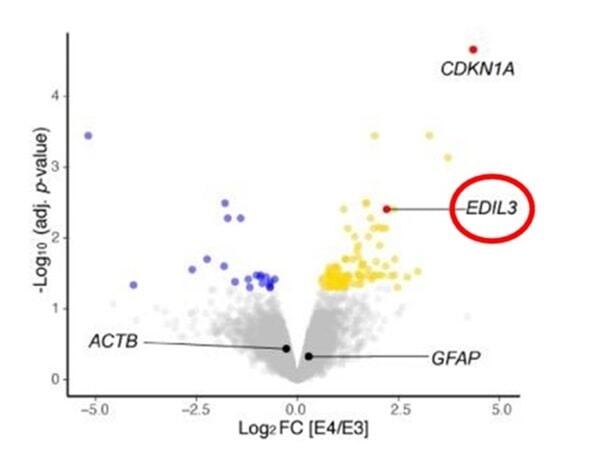Apolipoprotein epsilon 4 (APOE4) is a gene that indicates susceptibility for Alzheimer's disease. An estimated 10% of the Japanese population is said to have the APOE4 genotype. Individuals with APOE4 have a more than 3.5 times higher likelihood of developing Alzheimer's disease than those without this genotype. The loss of synapses between neurons has been observed in the brains of patients with preclinical Alzheimer's disease. This phenomenon is likely involved with progression of the disease.
A research group led by Professor Hideyuki Okano, Project Senior Assistant Professor Hirotaka Watanabe, and Graduate Student Rei Murakami of the School of Medicine at Keio University has clarified the molecular mechanism through which APOE4-expressing astrocytes negatively affect neurons. Experts anticipate that this discovery will lead to personalized medicines for patients carrying APOE4. The study was published in an online issue of Stem Cell Reports.

Provided by Keio University
Using a genome editing technique, the research group generated APOE4-carrying induced pluripotent stem (iPS) cells from healthy APOE3-carrying iPS cells and further generated human astrocytes carrying APOE4. Then, the impact of these astrocytes on neurons was examined by co-culturing the APOE3- or APOE4-expressing astrocytes with neurons. Morphological analysis of the dendritic spines that make up a synapse revealed that their number was decreased, and their maturity was reduced in neurons co-cultured with APOE4-expressing astrocytes.
Analysis of the changes in gene expression in the APOE4-expressing astrocytes revealed an increase in the expression of EDIL3 (which stands for EGF-like repeats and discoidin domains 3), a gene that encodes an extracellular matrix protein. Moreover, culturing neurons in EDIL3-enriched medium resulted in a decrease in the number of spines, similar to the results of co-culturing neurons with APOE4-expressing astrocytes.
These results demonstrate that APOE4-expressing astrocytes secrete the neurotoxic extracellular matrix protein EDIL3 and thereby induce synapse dysfunction between neurons.
Further analysis using postmortem human brains has suggested a link between APOE4 and EDIL3-, each of which had been separately shown to be associated with Alzheimer's disease.
Journal Information
Publication: Stem Cell Reports
Title: Astrocytic APOE4 genotype-mediated negative impacts on synaptic architecture in human pluripotent stem cell model
DOI: 10.1016/j.stemcr.2023.08.002
This article has been translated by JST with permission from The Science News Ltd. (https://sci-news.co.jp/). Unauthorized reproduction of the article and photographs is prohibited.




